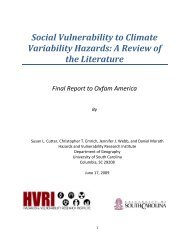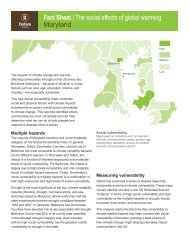Poverty Footprint Study on how the Coca Cola - Oxfam America
Poverty Footprint Study on how the Coca Cola - Oxfam America
Poverty Footprint Study on how the Coca Cola - Oxfam America
Create successful ePaper yourself
Turn your PDF publications into a flip-book with our unique Google optimized e-Paper software.
11<br />
Value chain: Diversity and<br />
women’s participati<strong>on</strong><br />
Headlines<br />
Women involved in sugar growing and harvesting face<br />
traditi<strong>on</strong>al gender biases, thus limiting <strong>the</strong>ir ability to earn<br />
an income, own land, access credit and build <strong>the</strong>ir skills.<br />
Very few women work in SABMiIIer’s bottling<br />
plants in both countries, despite n<strong>on</strong>discriminati<strong>on</strong><br />
policies in place.<br />
Women play a significant role in <strong>the</strong> retail of <strong>Coca</strong>-<strong>Cola</strong><br />
products, yet <strong>the</strong>ir ability to be successful is hindered by<br />
lack of access to credit, training and support networks.<br />
60 Exploring <strong>the</strong> links between internati<strong>on</strong>al business and poverty reducti<strong>on</strong><br />
Women represent a large proporti<strong>on</strong> of <strong>the</strong> world’s<br />
poor and face unique barriers when seeking<br />
educati<strong>on</strong>, employment and health care. Women are<br />
more likely than men to be denied basic rights, <strong>the</strong>y<br />
often have a limited role in decisi<strong>on</strong> making and are<br />
more vulnerable to violence. Complex systems of<br />
discriminati<strong>on</strong> prevent women from breaking through<br />
<strong>the</strong> barriers that often c<strong>on</strong>sign <strong>the</strong>m to live in poverty.<br />
Women are often underrepresented in <strong>the</strong> most<br />
secure jobs in society and overrepresented in <strong>the</strong><br />
most vulnerable forms of informal work. 58 Promoting<br />
gender equality and women’s full participati<strong>on</strong><br />
in ec<strong>on</strong>omies can help drive ec<strong>on</strong>omic growth:<br />
numerous studies have s<strong>how</strong>n that when women’s<br />
incomes increase, family health, educati<strong>on</strong> and wellbeing<br />
improve.<br />
Women’s empowerment<br />
Women in both countries face numerous forms of<br />
gender-based discriminati<strong>on</strong>, which limits <strong>the</strong>ir ability<br />
to fully c<strong>on</strong>tribute to ec<strong>on</strong>omic and social value<br />
creati<strong>on</strong> in <strong>the</strong>ir communities. In Zambia, many girls<br />
are prevented from going to school in favor of early<br />
marriage—an estimated <strong>on</strong>e out of four girls ages 15<br />
to 19 is married, divorced or widowed. Polygamy is




